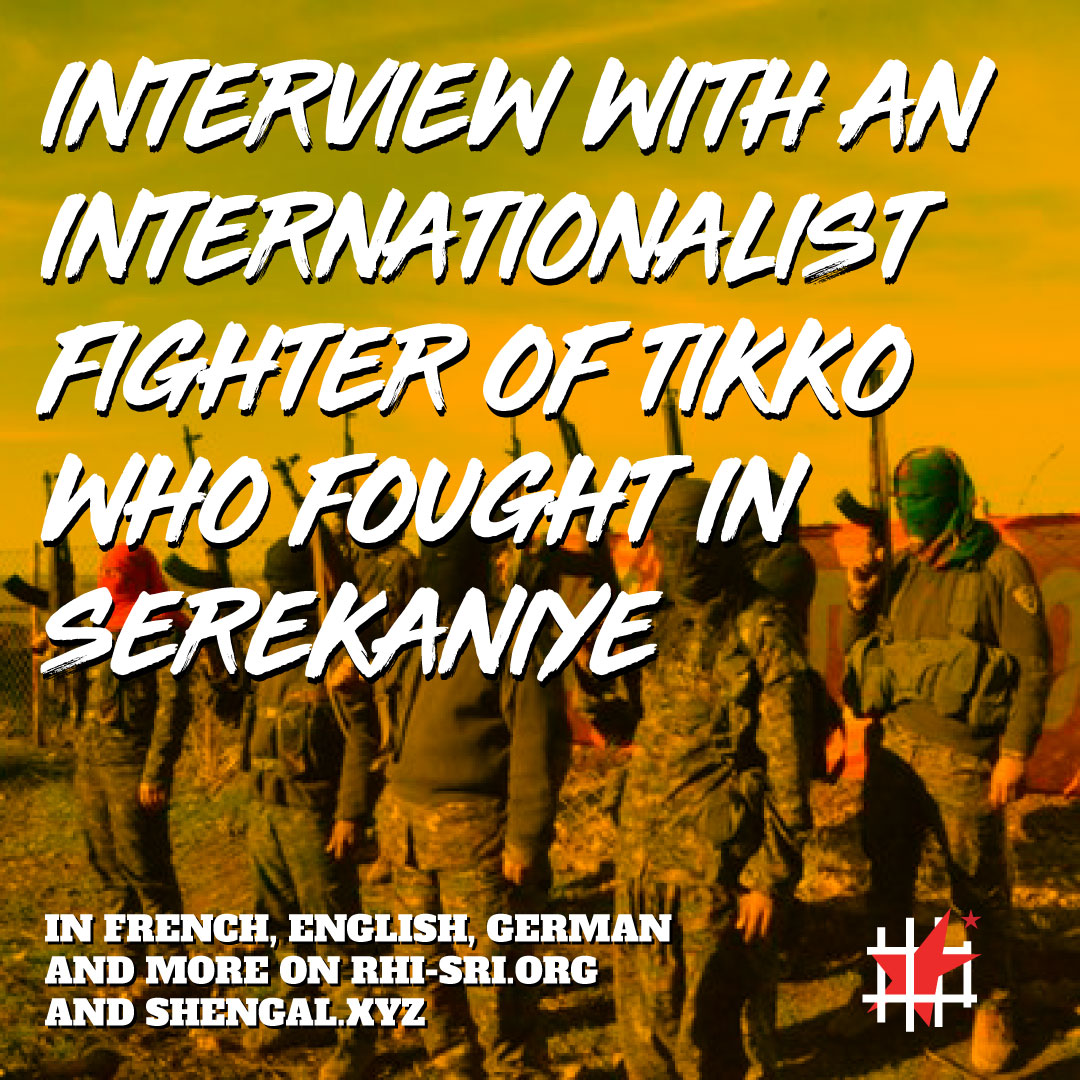Interview with an internationalist fighter of TIKKO who fought in Serekaniye.
1. Introduce yourself and tell us your situation at the moment of this interview?
I’m an internationalist fighter, member of the TIKKO. TIKKO, like the other organisations composing the IFB, actively participated in the defense of Serekaniye. We pulled out of the city a few days ago, after 12 days of fighting in the direction of Til Tamir and Haseke. The war continues, the operations of Turkey and its FSA islamist puppets continue especially near the village of Menajir. They are trying to get closer so they can controle the whole road between Serekanye and Til Tamir. We are today involved in the organisation of the defense of Menajir and Til Tamir.
2. You just came back from Serekaniye, what’s the importance of this city for the war as a whole?
Serekaniye is an important city in the history of the Rojava revolution, in 2012-2013 people repelled the attacks of FSA and Al-Nusra and since then the people of Serekaniye always defended the revolution. Serekaniye was a pillar city of the revolution, a fact that Erdogan was aware of. That’s why he strived to take it down. On the other hand, its geographical situation always made it an easy prey for the Turkish State. We always knew that in the event of an invasion, Serekanyie would be one of the first targets.
3. Does analysis of Afrin has an importance for long-term preparations ? What does pulling back mean for the fighters?
Afrin reminded us the revolutionary principle according to which, in the war, one must consider its own forces as primary and the allied forces (here the imperialists, especially USA and Russia) as secondary and instable. Following that principle, after the fall of Afrin, the defense work for the border cities immediately started (such as building tunnels, protection,…) We knew we couldn’t trust the imperialists, Afrin was the first example, this new occupation period is the second.
4. Internationalists fought an important fight. What does it mean for IFB?
The situation of the international movement was quite mixed in the last year. Imperialists were always annoyed by our presence here, and they pressured PYD to cut relationships with our work for internationalism. When war starts, all those diplomatic issues vanish and the revolutionary forces are united again. IFB took an active part in defending Serekaniye and keeps being present on the frontlines in Til Tamir area. As long as the reactionary forces will be assaulting the peoples of the region, the IFB will continue to exist and to fight.
5. What’s your analysis about coming developments in this war?
It’s really hard to make plans for the future. The agreement between Russia and Turkey to be pulled out from 32km seems to be accepted, as Mazlum Kobane declared. Even if it seems negative, it does not announce the end of revolution, because the democratic project is not only developing in Rojava, but in the whole SDF-controlled territory.
The main aspect which we will have to focus in the future is organising the people. If we were not able to defend Serekaniye and Gire Spi today, it is not only because of our military weakness. In the war, the human factor is the main factor. If the large majority of the people was really supporting us, we wouldn’t have been defeated, when revolutionary forces do have the support of the people, they are unbeatable. A concrete example can be seen in Turkey’s Kurdistan, PKK has been fighting for more than 35 years, and despite the fury of Turkish armed forces it keeps reinforcing, same for TIKKO’s guerilla still staying up after 47 years fighting.
6. What would you say to the international solidarity movement?
In war, there are always ups and downs. I remember that after 7-8 days fighting in Serekaniye, my morale was not high, with the violence of war, the tiredness, the feeling of isolation… But I had the occasion to contact the comrades in second lines and they informed us that there were solidarity actions organised throughout the world to support us and that the world was supporting our resistance. It may seem ridiculous but it gave us a lot of strength and motivation to keep fighting. Apart from this personal anecdote, on a more objective point of view, the revolution is international. The revolution in Rojava can not succeed if it stays isolated, like Vietnam couldn’t have defeated USA if the American people wasn’t pressuring the US State against war. If the peoples of the world, especially in Europe and USA do not mobilize to prevent USA, France, Germany, etc to collaborate with Turkey, or to bring back militaries in the region to defend their share of the oil, the war won’t stop. The peoples of the region just want to live in peace and secure a serene future for their children. The peoples write history, but in time of imperialism, the histories of peoples are mixing together and the future of this region isn’t only depending of the local population. That’s why we call upon all revolutionaries of the world to organise the solidarity with the peoples of the region and to pressure the States they live in to make them stop collaborating with Turkish fascist State, the main responsible for most evils in the region.
